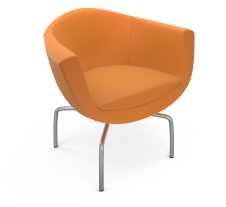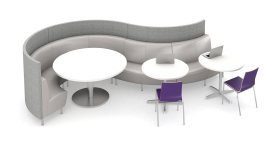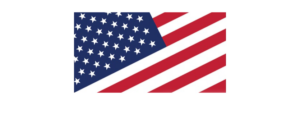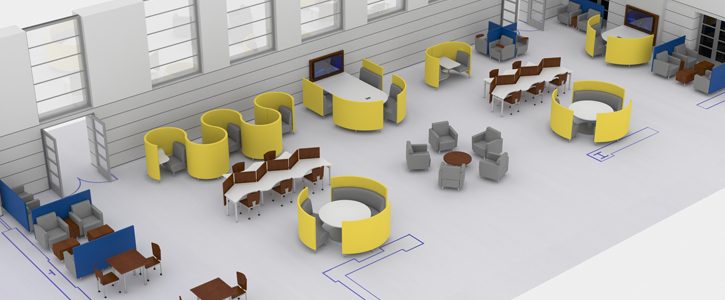
Why is it that when we buy furniture that seems reasonably priced, we spend more money afterwards repairing, replacing, or renovating? More often than not, inexpensive furniture incurs long term costs, making it the budgetary elephant in the room. AGATI explores TCO, or Total Cost of Ownership, in our blog this week, and we dig deep to find proof that making an investment in furniture for your space is truly more cost effective than the chair you bought on sale.
 The attraction of cost minimization
The attraction of cost minimization
When assessing proposals and quotes for new (or replacement) public space furniture, facility and asset managers are often inclined to choose the most inexpensive contender that ticks all the necessary boxes.
At face value, it makes perfect sense: why ever pay more than you must for something as simple as desks and chairs? Why not choose the least expensive product as long as you believe it will satisfy minimum your requirements?
In a world of limited capital budgets and constant cost pressures, financial extravagance is rarely appreciated by either controllers or executive management. Showing an ability to cost effectively implement a fit-out or refurbishment can be perceived as an indicator of negotiating smarts and managerial competence.
Yet, counter intuitively, investing more upfront can actually deliver an organization long term financial and productivity benefits.
Base price is just the starting point
The true cost of ownership must also consider items such as freight charges, taxes, any packaging or special handling required and services such as assembly and installation. Even the term “Delivered Price” can mean many things.
Will the shipment only be delivered to your dock? Will you require inside delivery? It’s important to factor all of these items into the order’s total cost while making a purchasing decision.
Be sure to review and compare warranties, as well. Hopefully, you’ll never need them. But if you do, it’s good to know upfront exactly what is covered, and for how long.
 Why TCO is a better measure of true value
Why TCO is a better measure of true value
If you make an evaluation based only on the initial purchase and installation costs, you implicitly assume that every other subsequent cost is going to be equal across competing products.
This is rarely — if ever — the case. The initial purchase price never encompasses the total cost of ownership (TCO) of an asset.
There are always additional and ongoing costs to consider: maintenance, reconfiguration costs when organizational change is required, and disposal costs when you reach end-of-life.
And total cost of ownership often has an inverse relationship with product life: as one goes up, the other drops.
That’s why a single-minded focus on short term cost management often creates false economy — an action that saves money at the beginning but, over a longer period of time, results in more money being spent or wasted than was saved in the first place.
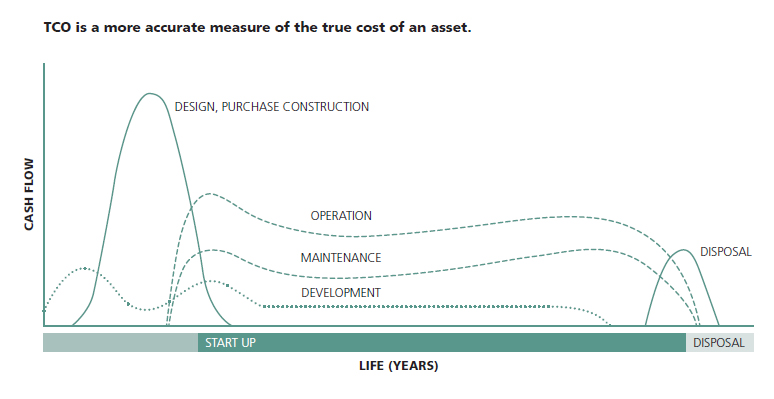

Furniture is an investment, not just a cost.
It’s easy to view furniture as a line item, but it has one of the most significant impacts on the experience of your public space. TCO is a key tool for organizations that realize furniture is an investment, enabling a rigorous and complete assessment of benefits and costs. TCO examines not only the acquisition cost, but maintenance and replacement costs that are likely to affect the actual ownership costs.
A true life cycle cost analysis should include the initial purchase cost and any cost to maintain the product over the life cycle time period. Initial purchase cost, installation charges, maintenance requirements, mid-life modification costs, plus the actual expected life must be factored into the analysis to yield the true monetary outlay of the business.
When choosing cheap drives up cost, you purchase an inexpensive chair that is designed for occasional use. But it ends up being used every day in reception. It wears out and breaks sooner than you anticipated and you have to replace it with another.
In doing so, you cancel out the initial savings of opting for the inexpensive chair over a more expensive alternative designed to withstand heavy wear and tear.
 Price vs. Quality: How long will it last?
Price vs. Quality: How long will it last?
The least expensive product might satisfy requirements the day it’s delivered and installed. But is it sufficiently “future proof?” As in, after six or nine months of use, does it develop a “wiggle” or does the finish wear off? Those are two examples of how a low cost solution can leave you in the lurch, becoming either in-viable or unusable before the expected end of its useful life.
Technological developments and changes in user needs are key factors that can reduce the effective life of furniture assets, or can require additional investment for re-configurations or upgrades — additional storage, or electrical circuits or communications cables, for example. Furniture of lower quality levels often cannot be modified, requiring organizations to start from scratch when needs change.
Cut-price quotes and special offers may also conceal quality problems that shorten the effective life of the furniture. For example, to reduce costs, furniture of a cheaper make might be constructed from materials that are more susceptible to wear and tear. Logically, it makes no sense to purchase furniture that costs half as much if it last less than half as long as the alternative.
Another consideration: furniture has an aesthetic. If it rapidly begins to show signs of wear or age because of cheap construction, that has an impact on the look of your public space.
Capital and operational budgets
A long, useful life for your furniture is crucial — the operational budgets that fund upgrades, repairs and replacements tend to be lean. Money might not be readily available to pay for extensive modifications or repairs to office furniture.
Worse, if you encounter large, unplanned operational expenses, this can end up consuming cash that would be otherwise set aside for capital expenditure, possibly affecting both the size and availability of future capital budgets.
 Price vs. Quality: Productivity, ergonomics, and health
Price vs. Quality: Productivity, ergonomics, and health
Strictly cost-driven furniture decisions can also have profound consequences for user health, safety, and productivity. Consider that back pain is second only to the common cold as the leading cause of work absence (University of Missouri study) and that repetitive motion injuries account for more than $2 billion in annual workers’ compensation costs (Liberty Mutual Workplace Safety Index).
Research from Mayo Clinic/Duke University suggests that sub-optimal postures associated with inadequate body support on furniture can contribute to decreased productivity, weight gain, diabetes, and other chronic illnesses. Indirect costs of furniture may include a decrease in work productivity (and the opposite — an increase in productivity — when people are seated in properly designed furniture).
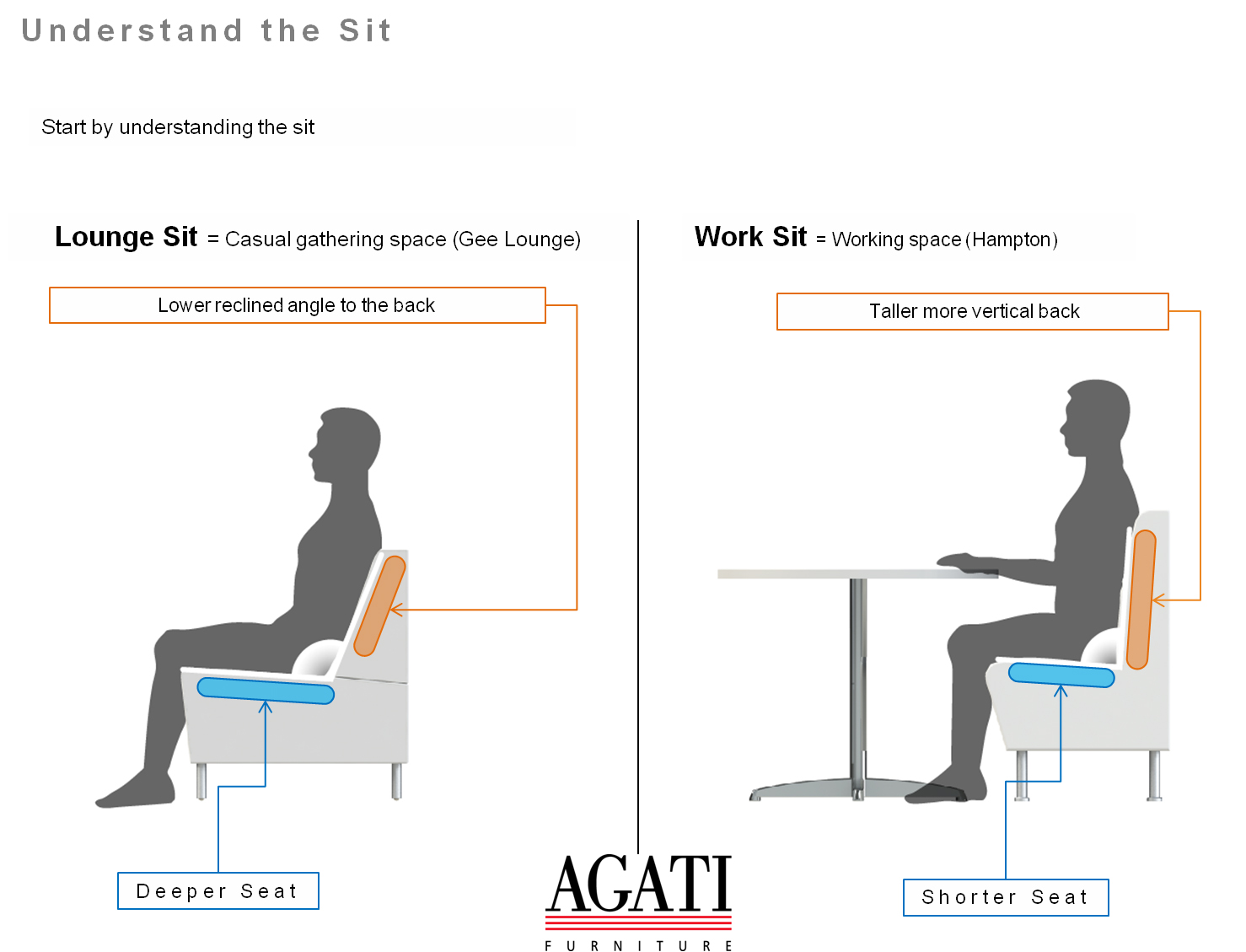
 Improving furniture life reduces environmental and disposal costs.
Improving furniture life reduces environmental and disposal costs.
Furniture also imposes environmental costs in its manufacture and disposal. In North America, 80% of furniture is simply dumped at the end of its lifespan. That’s hundreds of millions of dollars spent on transportation landfill fees each year by American companies to dispose of furniture that’s reached end-of-life. And after it reaches landfill, decomposition inevitably generates vast amounts of methane — the most potent greenhouse gas — as well as toxic leaches that can pollute soil and water supplies.
Because cheap construction may extensively use volatile organic compounds (VOCs) in paints, stains, and glues, choosing VOC-free alternatives such as water-, or powder-based finishes can offer a solution.
Another way to be more environmentally conscious is by purchasing the right wood, or choosing furniture made from local lumber using well-documented, sustainable forestry practices.
In general, it is always environmentally better to choose locally-made furniture that uses domestic wood — the transportation alone of foreign lumber generates an enormous carbon footprint. And it’s estimated that by 2020 shipping will generate more Nitrous and Sulphur oxides than all land-based activity.
Of course, simple logic suggests furniture with longer lifespans is undoubtedly less wasteful.
Occupancy and move-related costs
If you know you’re moving soon — especially if you’re not sure where you’re moving — there may be little justification to blow your budget on expensive pieces sized for the place your current premises. Moving costs may very well outweigh any benefits of investing in long-lasting, high quality furniture. However, if you know you’ll be there for a few years, you’ll still want resilient, quality furniture.
A quick guide to estimating furniture TCO.
Estimating all the direct and indirect costs associated with your furniture over its entire life cycle can be quite complicated.
However, this simplified formula allows a fair approximation of lifetime costs:
TCO = Initial capital outlay + life-time operating costs + life-time maintenance costs + disposal cost.
When expressed as a cost per year, this allows easy, instant and accurate comparison of true value for money.
TCO per year = TCO / lifespan of asset

The example in the table shows that the longer lifespan and lower ongoing costs of high-quality furniture outweighs the initial savings of choosing an average quality package.
Additionally, the much-harder-to-tangibly-value benefits such as increased productivity, reduced injury, lower absenteeism or stylish aesthetics are not shown in this table but can further justify the investment in higher-quality furniture.
Want to Learn More about AGATI & our TCO?
At Agati, we’ve been discussing TCO of our products with clients since the 1970s to deliver some of the most acclaimed industrial design plans in the educational field. If you’re searching for help in rethinking and reshaping your space, we’ll here to help guide you through the design process.
